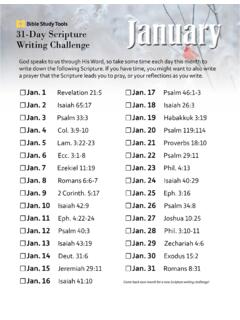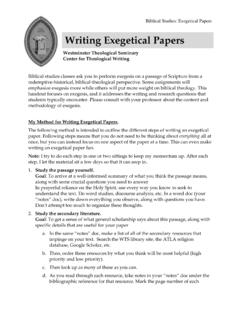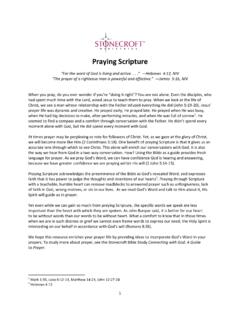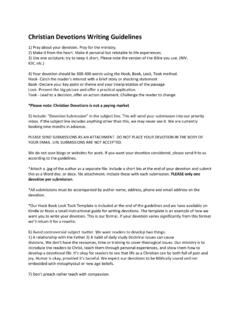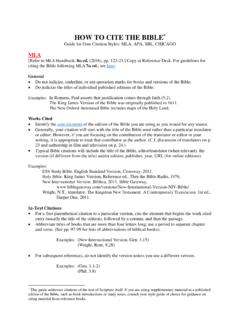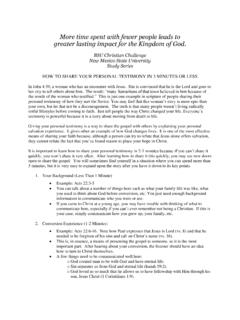Transcription of The uses of Scripture in Counseling - The Crossing
1 Using the Scriptures in Counseling 1 Running Head: USING THE SCRIPTURES IN Counseling Guidelines for the Effective Use of the Bible in Counseling Philip G. Monroe Biblical Theological Seminary Using the Scriptures in Counseling 2 Abstract Though much has been written about the place and value of Scripture in Christian Counseling , clinicians do not have yet a body of literature regarding the effective use of the Bible in the act of Counseling . This essay provides a brief review of how Christian Counseling literature approaches the Scriptures, discusses the risks of its unthoughtful use, and sets out basic guidelines for more effective use paying close attention to matters of purpose, contextualization, and client/counselor rapport. Four short vignettes are included to illustrate the possibility of diverse use while following the guidelines. Using the Scriptures in Counseling 3 How ought counselors to use the Scriptures in the act of Counseling ?
2 1 Given that professional Christian Counseling (distinct from the ministry of pastoral care) has been a phenomenon in this country for nearly 40 years, you might think this question long and well answered. Peruse the literature and you will be quite surprised with what appears to be a complete absence of information regarding the process of using the Bible with counselees. The literature that does speak of both the Bible and Counseling falls into two general categories: grand apologies regarding the relationship of the Scriptures to Counseling or specific issue essays connecting biblical passages with certain problems of living. As a result, the potential for abuse and misuse of the Bible in Counseling is greatly increased. This essay intends to give a brief review the current relevant literature regarding the use of the Bible in Counseling , explore the potential risks resulting from our neglect of this important topic, and conclude with several basic guidelines to help clinicians use the Bible effectively in the act of Counseling .
3 The Current Status Most Counseling related literature discussing the Bible or particular texts falls in to one of two categories: apologies that set out the relationship between the Bible and the science or practice of Counseling or specific issue essays focused on a particular problem in living. The apologetic literature tends to be theoretical in nature and usually defends the author s opinion about which side of the equation is more relevant or primary to the act of Counseling . Some authors tout the power and sufficiency of the Word as well as its purpose and scope ( , Baker, 1986, Hindson & Eyrich, 1997; MacArthur, 1993, 1991; Mack, 1998; Powlison, 1999, 1993, Welch & Powlison, 1997). The Bible may not speak 1 Admittedly, I make the assumption that counselors can and should use the Scriptures in the therapeutic environment since the Scriptures are not merely technique, but avenue to the presence of God.
4 However, it is not the only avenue and other means may be more effective at any given moment. Using the Scriptures in Counseling 4 about every Counseling issue, but for this audience it has something life-changing to say to everyone no matter the struggle. When professional counselors write about the Bible in this larger context, they tend to explore the relationship between special and general revelation as it relates to psychological inquiry ( , Carter & Narramore, 1979; Collins, 1981, Crabb, 1981; Hurley & Berry, 1997; Johnson, 1992).2 These grand scheme essays occur less often today, in part due to a reduced interest in trying to build a single model of change that the Christian community can rally When discussing more narrowly the Bible and Counseling , both biblical and professional counselors have written about how the Bible addresses specific issues such as anxiety, depression, self-esteem, boundaries, trauma, and marital discord ( , Allender & Longman, 1994; Armentrout, 1995; Jones, 1999; Powlison, 1999, 2000; Stover & Stover, 1994; Tripp, 1994).
5 4 These essays illustrate how biblical content is apropos to a wide variety of problems people face. Impossible as it may seem, we have few examples of how one might use the Scriptures in the act of Counseling . How should we bring counselees to the text of Scripture ? While there are a few attempts to look at how counselors might better interpret the Scriptures when developing or defending a particular theory ( , Cranmer & Eck, 1994; Maier & Monroe, 2001; Schultz, 2001), and a few more examples of how wisdom literature might be meaningful in Counseling ( , Schultz, 2001; Schwab, 1998, 1997a/b, 2 There is not, by any stretch of the imagination, consensus regarding the relationship between psychology and the Bible amongst professional counselors. For some the Bible holds authority; for others there is very little overlap between biblical and psychological data. 3 For the most part, practitioners and scholars have given up attempts at articulating grand integration models.)
6 The prevailing sense is that relational attachment to faculty, not articulation of grand models, depicts the process of learning to integrate (Sorenson, Deflinger, Bufford, & McMinn, 2004). 4 In reality, every book, chapter, or article that references biblical support for theories or goals falls into this category. Using the Scriptures in Counseling 5 1996a/b, 1995), we have done a rather poor job analyzing the best practices for using the Bible in Counseling . Why This Neglect? I suspect several reasons play into this neglect. First, writing about any process is difficult and highly idiosyncratic. Even individuals aspiring to the same model of Counseling likely bring their own style and procedure to what they do. Second, professional counselors may feel nervous about venturing into an area that is outside their academic training. Still others may think that such writing is dangerous given the many misuses and abuses of the Bible by some counselors.
7 Third, biblical counselors may assume process articles either manipulate the Spirit s guidance or are of such basic knowledge that scholarly articles are unnecessary. Finally, the dearth of writing in this area may well be the result of the lack of agreement amongst counselors as to the role the Bible plays in the kind of problems that bring people to Counseling . When the didactic and exhortative uses of the Bible have been so emphasized in Christian culture, it may not seem relevant to those therapists who operate from insight and affective models. Whatever the reasons, counselors do not now possess a literature on ways to use the Scriptures in Counseling . The Result? When counselors are not attentive to interpersonal processes at play in helping relationships, they are more likely to use techniques that serve their own purposes and desires without regard for the particular needs of the client. Intentional or not, when counselors serve their own desires the healing relationships and the interventions employed lose value, much like a picture of a sunset does not capture the vibrancy Using the Scriptures in Counseling 6 experienced when seeing it with ones own eye.
8 Worse than losing luster, the potential for harm increases. This is especially true when the Scriptures are used in an unthoughtful manner. Consider two serious process problems resulting from the unmeditated use of the biblical text in counselor from counselee. It is an unfortunate fact but far too many individuals have easy access to memories where they poured out their souls to another only to receive a hasty answer and Bible verse in the form of a projectile. Oswald Chambers (1937) warns, Now there is a wrong use of God s word and a right one. The wrong use is this sort of thing someone comes to you, and you cast about in your mind what sort of man he is, then hurl a text at him like a projectile, either in prayer or in talking as you deal with him. That is a use of the word of God that kills your own soul and the souls of the people you deal with. The Spirit of God is not in that. Jesus said, the words I speak unto you, they are spirit, and they are life.
9 6 Not surprisingly, the typical reaction is to recoil from a projectile and distance oneself from the shooter. If this confidant does not acknowledge or validate my feelings, perceptions, experiences, they are not safe nor caring of my situation. Sadly, this interaction has been repeated in both lay and professional Counseling situations and begs the question: Why are we inclined to shoot Bible bullets at those who are suffering? The answer is simple: quick and tidy answers serve our purposes. A verse or passage may baptize a personal opinion so as to give it greater credibility. It may provide comfort and 5 For the sake of space, I will not touch on the obvious problem of the misapplication of texts that distorts its meaning and purpose ( , using submission passages to send a battered woman back home, disregarding safety issues). Neither will I survey common misuses ( , superficial comfort, comfort alone when correction is also needed, correction without comfort, etc.)
10 6 As cited from the Complete Works of Oswald Chambers on CD-ROM. Using the Scriptures in Counseling 7 protect a fragile faith that might otherwise crumble under the weight of having to struggle with no clear answer to the why of a particular suffering (hence why Romans 8:28 is often used for the speaker s benefit). We, like Job s counselors, often desire a black and white God who is never mysterious and always follows human logic. Whatever the reason, when a counselor uses the Scriptures in an unthinking and/or self-serving manner, it produces a chasm between counselor and counselee and makes subsequent counsel Hardens hearts to God. The misuse of Scripture not only creates division between people, it also separates people from God. In contemporary Christian culture, we have a tendency to use the Scriptures as a technique to achieve peace and harmony. We look to the Bible as we might a magic wand, hoping that it quickly changes our outlook, or better yet, our circumstances.

